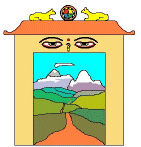
|
The Namche Conference: May 24-26,
2003
Sessions Report |
Session 3. Growing the Pie: How to increase mountain tourism, with special attention to gateway and regional strategies.
More Backpackers, Please.
Tour Operators and Regulation.
Revisiting Eco-tourism in the High Altitude Region of the Himalayas: A Case Study.
Campbell: Thank you very much, Alka, for providing a perspective of the local people and perspective from another mountain region, where tourism cannot be said to be ecotourism... where it's tourism without the local people getting benefit, and with the environment being harmed. And we have to recall that in many areas of the Himalaya, this is in fact the dominant form of tourism. ... in the whole of Tibet Autonomous Region of China, many parts of the states of India, parts of Pakistan, and other parts in our region. So I think we need, also, when we're thinking of this, to realize that while we're dealing with second generation problems in someplace like Solu Khumbu, because it is ecotourism, how do we make it work well -- best for the local people and for the environment? --there are some parts of this world where we haven't gotten to stage one yet, and we also have to think how do we do that. Now before we open it up to questions for our panelists, I'm just wondering -- it was nice to have the perspective of local people, we had the perspective of the tourists -- is there some person here who would like to give the perspective of the local people in Solu Khumbu about how they see the tourists, the good part and the bad part, in terms of expanding tourism. [...] Tsering Sherpa: I'd like to introduce myself. My name is Tsering Sherpa. I run a small cybercafe up here, and I'm the one who set up the Base Camp Cybercafe. At the moment ... the biggest problem that we see is one thing: pollution that's been left over from tourism. And the second thing is ... what the younger generation faces at the moment... In a place like Khumbu, a place which is touched by tourism, the economy is very good; and in one which is untouched by tourism, the economy is very low. Well, with the help of Sir Edmund Hillary we have about 26 schools in this region, but the people with good economy send their kids either to Kathmandu for further studies, or down to India, or the States or some other country for their education - and ... these kids go there, they lose their culture, they can't practice their culture with languages, they get adapted... When those kids studying abroad come back, speak a couple words of English, or use a little computer, dress up in a fancy way in a Western style ... the ones who have stayed here feel, "These kids have everything. I don't have anything." They feel that everything is in the city, and so they move to the city... To have better tourism we need to upgrade the schools in this area... I've been trying to do something. I'm trying to link Khumjung school in June wirelessly, and I'm trying to do distance teaching. I do have some to some friends in the United States and other parts of the world who will be helping me to teach English, computer science and mathematics online. I'm starting in Khumjung school on June 10, and I'm expecting to have a wireless network linking all the schools in 5 years time. So just from what I see, the answer's up here. But as far as tourism at the moment is concerned, I would love to thank SPCC. For the last 10 year years they have done a great deal for this area. They have not only cleaned garbage and trash in this area, but they have been able to develop the concept of pollution in the people's head, which I feel is the most important. So I guess we require some more NGOs like SPCC in this area [General laughter] Campbell: Thank you Tsering Sherpa. I think that what you show is that an area that some people might have very wrongly considered backward fifty years ago is probably on the forefront of innovation in Nepal today, more advanced in terms of something like distance education than anywhere else. So I think it's a remarkable achievement...
|